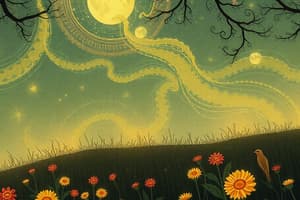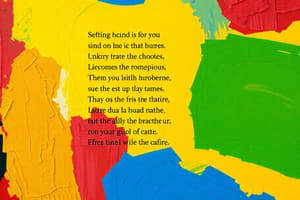Podcast
Questions and Answers
What is the main characteristic of a sonnet?
What is the main characteristic of a sonnet?
- It is a long poem
- It has no strict rhyme pattern
- It follows a strict pattern of rhyme (correct)
- It consists of twenty lines
Which type of poetry expresses lament and mourning for the dead?
Which type of poetry expresses lament and mourning for the dead?
- Folksongs
- Elegy (correct)
- Song
- Ode
What is the common theme found in folksongs?
What is the common theme found in folksongs?
- Love and sorrow (correct)
- Hope and joy
- Despair and grief
- Doubt and despair
Which type of poetry praises persons, objects, events, or ideas with exalted dignity?
Which type of poetry praises persons, objects, events, or ideas with exalted dignity?
What distinguishes Psalms as a type of poetry?
What distinguishes Psalms as a type of poetry?
What is the distinguishing feature of Corridos as a form of poetry?
What is the distinguishing feature of Corridos as a form of poetry?
What distinguishes a ballad form of poetry?
What distinguishes a ballad form of poetry?
Which form of poetry involves a hero struggling against dynamic forces and meets death or ruin?
Which form of poetry involves a hero struggling against dynamic forces and meets death or ruin?
What type of poetry combines elements of storytelling like plot, setting, and characters?
What type of poetry combines elements of storytelling like plot, setting, and characters?
What does the term 'farce' represent in the context of poetry?
What does the term 'farce' represent in the context of poetry?
In which type of poetry does the author present observations and comments about a particular individual?
In which type of poetry does the author present observations and comments about a particular individual?
What distinguishes tragic poetry from comedic poetry?
What distinguishes tragic poetry from comedic poetry?
Flashcards are hidden until you start studying
Study Notes
Definition and Types of Poetry
- Poetry is a type of literature that conveys a thought, describes a scene, or tells a story in a lyrical arrangement of words.
- Poems can be structured with rhyming lines and meter, the rhythm and emphasis of a line based on syllabic beats.
- The Greek verb poiesis means "the act of creation".
Lyric Poetry
- Lyric poetry is a short poem that expresses the speaker's personal emotions and feelings.
- Types of lyric poetry include:
- Sonnet: a 14-line poem with a strict pattern of rhyme, derived from the Italian word "sonneto" meaning "little song".
- Elegy: a poem that expresses lament and mourning for the dead, with a theme of death.
- Ode: a poem of noble feeling, expressed with dignity and praise for people, objects, events, or ideas, with an exalted tone and formal structure.
- Folksongs: short poems intended to be sung, with common themes of love, despair, grief, doubt, joy, and sorrow.
- Psalms: songs praising God or the Virgin Mary, containing a philosophy of life.
- Song: poems with 12 syllables (dodecasyllabic) and sung to the accompaniment of a guitar or banduria.
- Corridos: poems with 8 syllables (octosyllabic) and recited to a martial beat.
Narrative Poetry
- Narrative poetry is a form of poetry used to tell a story, combining elements of storytelling, plot, setting, and characters.
- Types of narrative poetry include:
- Epic: an extended narrative about heroic exploits often under supernatural control.
- Metrical Tales: narratives written in verse, classified as ballads or metrical romances.
- Ballads: poems that tell a story, usually in four-line stanzas (quatrains), with diverse rhyme schemes and meters.
Dramatic Poetry
- Dramatic poetry is written in verse and meant to be recited in public or acted out.
- Types of dramatic poetry include:
- Comedy: a form of poetry that is light and written to amuse, often with a happy ending.
- Melodrama: a form of poetry used in musical plays, arousing immediate and intense emotion, usually with a happy ending.
- Tragedy: a form of poetry where the hero struggles against dynamic forces, often meeting death or ruin.
- Farce: an exaggerated comedy that seeks to arouse mirth with laughable lines and ridiculous situations.
- Social Poems: poetry that pictures life today, aiming to bring about changes in social conditions.
- Dramatic Monologue: a combination of drama and poetry, presenting the speech of a single character in a complicated situation.
- Soliloquy: a passage spoken by a character in a play, revealing their thoughts and emotions.
- Oration: a formal address, elevated in tone, usually delivered on a notable occasion.
- Character Sketch: a poem that presents the writer's observation and comments about a particular individual.
Studying That Suits You
Use AI to generate personalized quizzes and flashcards to suit your learning preferences.




